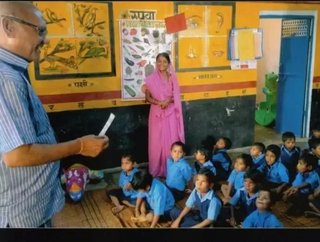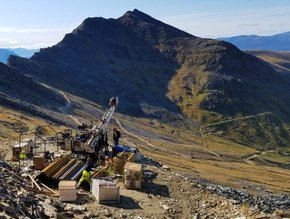Vedanta Resources and the importance of community engagement

We spoke with Ms. Roma Balwani, President, Group Communications & Sustainable Development, Vedanta Resources, on all things sustainability and Corporate Social Responsibility (CSR)
What is the bottom line/mission statement of Vedanta Resources?
The Core Purpose of the company is: Vedanta is a globally diversified natural resources company with low cost operations. We empower our people to drive excellence and innovation to create value for our stakeholders. We demonstrate world-class standards of governance, safety, sustainability and social responsibility.
Vedanta partners with all stakeholders based on the core values of trust, entrepreneurship, innovation, excellence, integrity, respect and care.
What is Vedanta Resources’ approach to community engagement and social responsibility?
Vedanta is committed to conduct its business in a socially responsible, ethical and environmentally friendly manner. As a diversified natural resources company, our commitment towards ‘Social License to Operate’ goes beyond the regulatory compliance and we are focused on the sustainable development, inclusive growth and greater value creation for all our internal and external stakeholders.
The philosophy of Social Responsibility and our sustainable development agenda is at the core of Vedanta’s strategic priorities and governs every business decision. Community engagement is a core pillar to continuously work towards improving the quality of life of the communities in its operational areas.
We aim to maintain an ongoing, transparent dialogue with all of our stakeholders in order to build the strong relationships that will support the growth of our communities and our nations, with free prior informed consent. We seek to convene with all our stakeholders in a neutral forum, to explore ways that we can add value and to work together with governments and NGOs on social responsibility projects.
Our activities are guided by our Sustainable Development Model, which we implemented in 2011. The model consists of five main pillars: Responsible Stewardship, Building Strong Relationships, Adding and Sharing Value, and Strategic Communications.
Vedanta’s mine reclamation at Sanquelim in Goa is a one of its kind in the country. Today there are lives that are supported as a result of the re-forestation initiative in the region. Even when the mining operations were shut for three years, our iron ore arm continued to support all the CSR and sustainability initiatives. Vedanta’s commitment to Goa is beyond just business. We are passionate towards the socio-economic development of the state through empowering communities and preserving nature. Our pioneering initiatives such as the Sesa Football Academy, the Sesa Technical School and a host of other activities have enriched and improved the lives of many extraordinary individuals who just needed a platform to prove their excellence.
How important do you feel community engagement/social responsibility is to a mining/exploration company, not just Vedanta but companies across the industry?
In the past, extractives companies focused primarily on technical objectives and production targets but there is now an understanding that a business must be run sustainably to ensure the longevity of its operations and to earn its social licence to operate.
Vedanta understands that effective stakeholder engagement and strong relationships are the bedrock of a sustainable business, which is why we prioritise stakeholder dialogue and free informed consent for all of our operations.
Social responsibility is particularly important for resources companies, since their operations are often located in remote regions or in developing countries, so it is essential that businesses provide the necessary physical and social infrastructure for communities to grow.
There are numerous such instances where organizations themselves or with the assistance of partnering NGOs have transformed communities. There are sterling examples where Indian trusts have made remarkable difference in the communities where they operate in which now have access to education, healthcare and skill development, enhancing opportunities for employment.
Vedanta’s Sustainability Development framework is positioned to ensure that we always engage in activities which not just benefit but also sustain our social license to operate. This is a term which is lesser known in different sectors, but very important for the natural resources sector. Hence our CSR approach has to be aligned to community development, rehabilitation and ensuring that the environment is safe for the community.
We work with a public private partnership model and engage on societal development projects that are aligned to not only the commercial activity of our business, but it ensures harmony and progress within the community and the state. So for example, Vedanta’s focus has been on child welfare, malnutrition, women empowerment, skill development, providing healthcare facilities which result in long term positive impact and provides opportunities to the local population that probably never existed before.
In Odisha for instance, where Vedanta has its aluminium smelters and power plants, the company has initiated a host of deep impact CSR activities. The resettlement colony at Jharsuguda, which houses the displaced families, is a model structure with health & sanitation facilities, school, street lights, adequate water supply, sports facilities, community halls and many other such amenities. Similarly at Lanjigarh, the company has built an equipped rehabilitation colony. Today they have access to healthcare from the local hospital set up by Vedanta and the company is happy to report that there has been zero deaths due to malaria for the previous three years, in the many villages which reported large number of deaths due to malaria in the past.
Could you detail one or two examples of any corporate social responsibility programmes that you carry out? For example, does Vedanta create job opportunities within the local communities, engagement with local schools/colleges etc.?
Education is a central part of our work in the community. Not only do we engage with local schools, but we also run 16 schools and colleges ourselves, most of which are located close to our operations. Last year alone, there were over 211,000 students enrolled at these institutions. In terms of higher education, Vedanta strives to enable talented students to realise their potential and provides scholarships to girls who may otherwise not be able to attend further courses. Last year, the company awarded 900 of these grants.
Vedanta is a strong advocate for female empowerment and child development in India. The company has recently launched a social initiative to completely transform the government’s state-run child welfare centres into pre-fabricated units with the latest technology and modern amenities. 4,000 of these centres, which are named ‘Nandghar’, will be built over three years across the country. Each facility will offer vital support to women and children and provide healthcare and nutrition. The centres will also offer education for children up to six years old and skills development opportunities for women, meaning they really have the potential to change lives in rural India.
Our women empowerment initiatives, Subalakshmi and Sakhi projects at Jharsuguda and Tuticorin, respectively seeks to make rural women economically independent and self-sufficient through product development. Today, the women have a combined saving corpus of Rs. 2.22 Crore.
The Subhalaxmi Cooperative is an all women cooperative promoted under the “Vedanta Integrated Jana Jeevika Yojana”, a livelihood project implemented by Vedanta Limited in Jharsuguda, Odisha. It is now one of the most prospering cooperatives of western Odisha, with having a presence in 55 villages of the Jharsuguda district. Over 2000 women have monetized their products and we have supported them with market linkages that has benefitted them in terms of the returns that they get for their products.
Our consistent support to women Self Help Groups (SHGs) in line with our reinforced focus on women empowerment; we supported 2,800 SHGs this year reaching 38,000 women. An example is Vedanta’s Hindustan Zinc Limited, in Rajasthan’s Sakhi programs to train It's 3000 rural and tribal women and about 250 self-help group. The focus of this activity is to create additional employment opportunities with optimum utilization of local resources and skills. Aligning to the group’s vision, Vedanta’s Sterlite Copper initiated a women empowerment programme ‘Sakhi’ in Tuticorin, Tamil Nadu, which has led to generation of income and better livelihood opportunities for 19,000 women across the region.
How much does a local community or local environment shape, influence and even dictate your decision making?
We believe in free prior informed consent, even for our community development initiatives. Which means that sometimes our activities take longer to implement, but it ensures that they are sustainable in the long term. We consult with local communities on a continuous basis and take their views into account when making decisions. We adapt our plans in line with feedback from all stakeholders.
As a company that prides itself on its commitment to responsibility and sustainability within the communities you operate in, what can other companies learn from Vedanta Resources?
All companies can learn from one another and we should look to our peers to see what we can do better. It is important to keep evaluating our approach and improve in line with global best practice.
We are particularly proud of our collaborative approach. Our commitment goes beyond regulatory compliance and we work together with communities, employees, government, local authorities, NGOs, shareholders and customers to create a positive impact. These relationships enable us to align our goals and target high priority areas.
Vedanta’s activities at the Lisheen Mine in Ireland eased this year after 17 years of operation. Lisheen has made a positive impact to the local and national economy, bringing significant employment opportunities to the area. Our priority is not just the physical closure of the mine, but also the aftercare of the site to ensure our commitment to stakeholders towards a productive use of the land. A detailed and fully-costed Closure, Restoration and Aftercare Management Plan is already underway, which includes its Biodiversity Action Plan, to build a sustaining economy in the surrounding region to ensure that a positive legacy remains. Furthermore, Vedanta has actively supported employees to find new employment opportunities or pursue further education and training, as part of its Outplacement Training Programme. Lisheen’s management team has been actively exploring further business opportunities and ways to utilise the considerable resources and skills available at Lisheen following the closure.
There is what some people consider a negative tide towards the mining industry, painting the image that the industry could do more to create healthy, sustainable and beneficial relationships within local communities, what are your thoughts on this? Do you agree?
A company or a corporation operates within the realm of various stakeholders – the shareholders, customers, suppliers, employees, communities, governments, regulators, bankers, all of whom have stakes in the company. Public expectations of big business have never been greater. Corporate governance is one of the most important pillars in maintaining the health and growth of business. This is true for all industries, not just mining. A large number of non-financial indicators such as ethical conduct, disclosure & transparency, sustainability and corporate social responsibility are all indicators of a good governed company.
Our priority is to keep building positive relationships with all our stakeholders and support the development goals of the local governments.
We are focused on continuing to improve our performance, with an emphasis on minimising our footprint on the environment and setting out a roadmap for the long-term sustainable development of the company.
The civil society can play a major role in collaborating with companies and looking at development of the community rather than creating impediments. Economic progress will only be possible if there is job creation. Our Chairman Mr. Anil Agarwal’s vision and passion is to see the change in India in terms of poverty alleviation, job creation and women empowerment. “India’s self-sufficiency in the natural resources sector has the capacity to create millions of employment opportunities. This will help eradicate poverty and empower our communities, ensuring our economic and social development,” he says.
The November issue of Mining Global Magazine is live!
Follow @MiningGlobal
Get in touch with our editor Dale Benton at [email protected]






